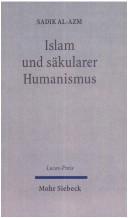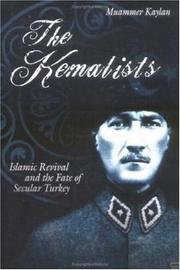| Listing 1 - 10 of 143 | << page >> |
Sort by
|
Book
ISBN: 9981838519 9789981838512 Year: 1997 Publisher: Casablanca: Le Fennec,
Abstract | Keywords | Export | Availability | Bookmark
 Loading...
Loading...Choose an application
- Reference Manager
- EndNote
- RefWorks (Direct export to RefWorks)

ISBN: 3161485270 Year: 2005 Publisher: Tübingen Mohr
Abstract | Keywords | Export | Availability | Bookmark
 Loading...
Loading...Choose an application
- Reference Manager
- EndNote
- RefWorks (Direct export to RefWorks)
Book
ISBN: 9780197661789 9780197661802 9780197661819 9780197661796 Year: 2024 Publisher: New York Oxford University Press
Abstract | Keywords | Export | Availability | Bookmark
 Loading...
Loading...Choose an application
- Reference Manager
- EndNote
- RefWorks (Direct export to RefWorks)
"This book argues that the common notion of a fundamental conflict between the secular and the religious cannot be applied to Islam. This is not because Islam rejects the secular in favor of the religious; it is because Islam's concept of the religious includes the secular. This is what is captured by the term "Islamic Secular." Contrary both to the notion that "religion" in Islam equals "sharī'ah," and to the concomitant notion that sharī'ah is the all-encompassing, exclusive metric of assessment in Islam, this book argues that, while Islam is all-encompassing, sharī'ah is bounded. This leaves a space between the limited circumference of sharī'ah and the unlimited circumference of Islam. While both spaces are "religious" in that they come under the adjudicative gaze of the God of Islam, only the shar'ī space draws directly upon sharī'ah and its sources, while the non-shar'ī space does not. In the end, this allows for a "religious secular," a space wherein matters remain "religious" but are not based on or assessed in terms of the content of sharī'ah or its sources. These shar'ī and non-shar'ī elements are not rivals but complements. As such, both "secularism" and "secularization," as non- or anti-religious tropes, are alien to the Islamic Secular"--
Book
ISBN: 9780367698591 Year: 2021 Publisher: Abingdon, Oxon ; New York, NY : Routledge,
Abstract | Keywords | Export | Availability | Bookmark
 Loading...
Loading...Choose an application
- Reference Manager
- EndNote
- RefWorks (Direct export to RefWorks)
"Within contemporary Western European academic, media, and socio-political spheres, Muslims are predominantly seen through the lens of increased religiosity. This religiosity is often seen as problematic, especially in the contexts of the securitised discourses of Islamist terrorism. Yet, there are clear indications that there is a growing number of people who grew up in Muslim families, but who no longer subscribe to Islam, nor call themselves religious at all. Drawing on fieldwork in the UK and the Netherlands, this study examines those experiences of people moving out of Islam. It rigorously questions the antagonist nature of the debate between 'the religious' and 'the secular', of who is in and who is out, and argues for the recognition of the ambiguity that most of us live in. Revealing many complex forms of moving out, this study adds much-needed nuance to understandings of secularity and Muslim identities in Europe"--
Islam and secularism --- Islam --- Muslims
Book
Abstract | Keywords | Export | Availability | Bookmark
 Loading...
Loading...Choose an application
- Reference Manager
- EndNote
- RefWorks (Direct export to RefWorks)
Islam and secularism --- Islam --- Muslims
Book
ISBN: 9782818504154 2818504155 Year: 2014 Publisher: Paris: Pluriel,
Abstract | Keywords | Export | Availability | Bookmark
 Loading...
Loading...Choose an application
- Reference Manager
- EndNote
- RefWorks (Direct export to RefWorks)
[2014] « Un spectre hante l’Occident, le spectre de l’islam » : paraphrasant le Manifeste du parti communiste, écrit en 1848, on pourrait ainsi résumer le sentiment qui s’est emparé des dirigeants du Nord, relayés par quelques intellectuels soucieux de défendre les valeurs du « monde civilisé » contre celles des « barbares ». En France, la peur est d’autant plus forte qu’elle se situe à la confluence de deux angoisses : celle du terrorisme islamiste, accentué par les horreurs de la guerre civile algérienne et les attentats du 11 septembre 2001 ; celle de la « menace » que représenteraient les nouvelles classes dangereuses, les immigrés issus des pays anciennement colonisés, notamment du Maghreb. C’est le fantasme de cette « menace » islamique, à la fois interne et externe, qu’Alain Gresh démonte ici. Non en présentant une défense de l’islam, mais à partir d’une vision laïque et rationnelle des musulmans, dans leur diversité historique et géographique. Tout en fournissant les éléments essentiels pour comprendre la religion musulmane et son histoire, l’émergence de l’islam politique et son rôle dans les différents conflits, cet ouvrage revient sur les débats qui ont secoué la France. L’islam est-il compatible avec la démocratie ? Le foulard est-il une arme contre la laïcité ? Les musulmans peuvent-ils s’intégrer dans les sociétés européennes ? Les citoyens français, musulmans et non musulmans, croyants et non croyants, peuvent-ils bâtir ensemble un avenir commun ?
Islam --- Islam --- Muslims --- Islam and secularism
Book
Abstract | Keywords | Export | Availability | Bookmark
 Loading...
Loading...Choose an application
- Reference Manager
- EndNote
- RefWorks (Direct export to RefWorks)

ISBN: 1591022827 Year: 2005 Publisher: Amherst (N.Y.) : Prometheus books,
Abstract | Keywords | Export | Availability | Bookmark
 Loading...
Loading...Choose an application
- Reference Manager
- EndNote
- RefWorks (Direct export to RefWorks)
Islam and secularism --- Kemalism. --- Turkey --- History
Book
Abstract | Keywords | Export | Availability | Bookmark
 Loading...
Loading...Choose an application
- Reference Manager
- EndNote
- RefWorks (Direct export to RefWorks)
Book
ISBN: 0472129546 Year: 2021 Publisher: Ann Arbor, Michigan : University of Michigan Press,
Abstract | Keywords | Export | Availability | Bookmark
 Loading...
Loading...Choose an application
- Reference Manager
- EndNote
- RefWorks (Direct export to RefWorks)
Bound Together takes a new look at twentieth-century Turkey, asking whether its current condition was inevitable; what it will take for Turkish women and men to regain their lost freedoms; and what the Turkish case means for the prospects of freedom and democracy elsewhere. Contrasting the country's field of poetry, where secularization was the joint work of pious and nonpious people, with its field of the novel, where the usual Turkish pattern prevailed, it inquires into the nature of western-nonwestern difference. Turkey's poets were more fortunate than its novelists were, Bound Together finds, for two reasons. First, poets were slightly better at developing the idea of the autonomy of art from politics. While piety was a marker of political identity everywhere, poets were better able than novelists to bracket political differences when assessing their peers as the country was bitterly polarized politically as the century wore on. Second, and more importantly, poets of all stripes were more connected to each other than were novelists. Their greater ability to find and keep one another in coffeehouses and literary journals made it less likely for prospective cross-aisle partnerships to remain untested propositions. Such partnerships made writers better able to pursue their career objectives-in other words, with such ties they were freer. The freedom that the West enjoys due to secularization is therefore not an unattainable goal in other regions of the world. Nor is it the fruit of a particularly difficult political undertaking involving the capture and the taming of the state: all it takes is for ordinary people to be bound together in the semiformal institutions of civil society.
Islam and secularism --- Poets, Turkish --- Authors, Turkish
| Listing 1 - 10 of 143 | << page >> |
Sort by
|

 Search
Search Feedback
Feedback About UniCat
About UniCat  Help
Help News
News